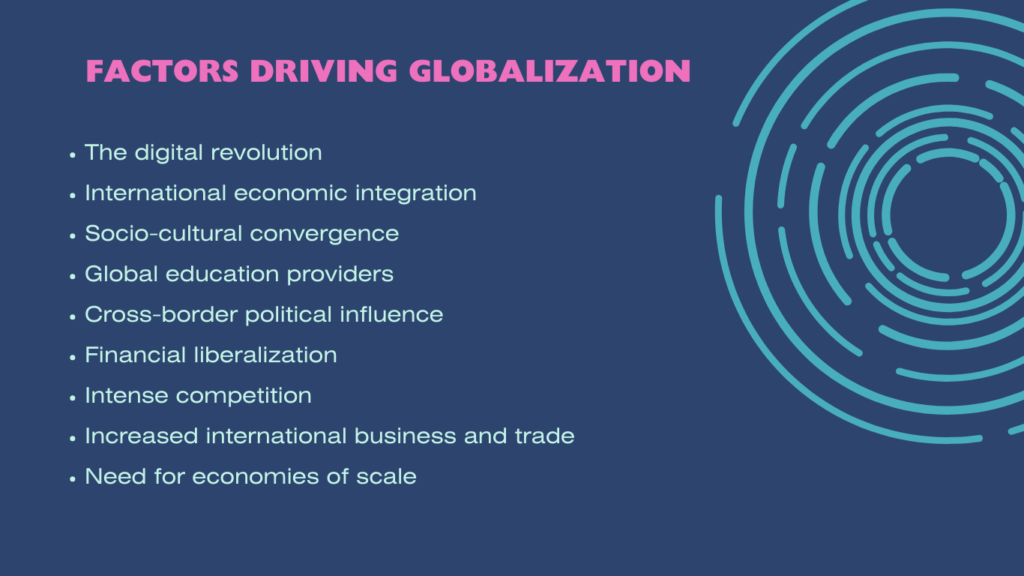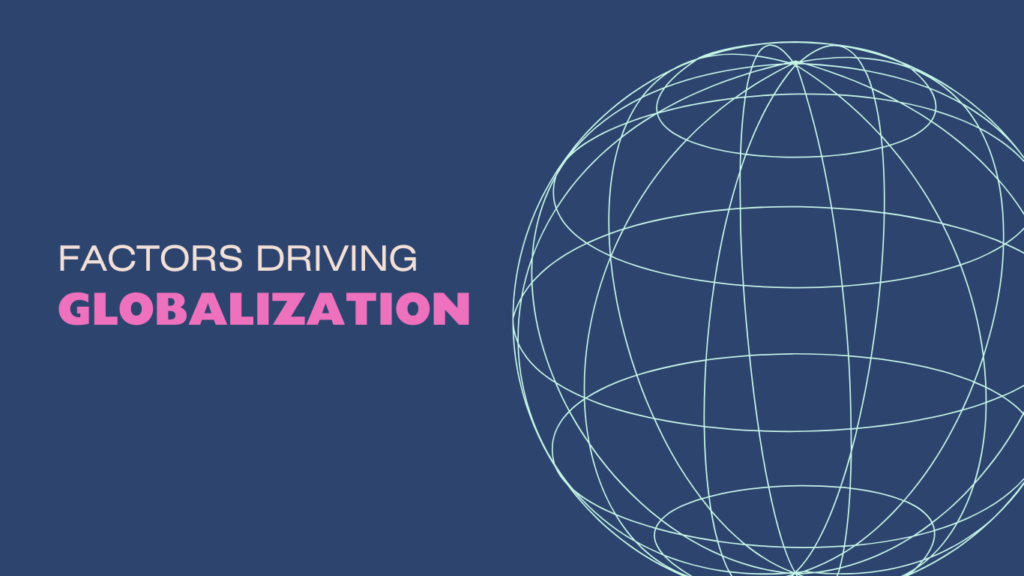Globalization is the process of eliminating barriers to trade between countries in order to enhance the integration, interconnectedness, and connectivity of manufacturing processes and capital markets, as well as the movement of financial resources, products, and services across borders, thus facilitating international trade and economic development in intricate ways.
Globalization Factors
The digital revolution: The internet has simplified access to goods and services produced anywhere in the world. The spread of digitality drives globalization around the globe. It is now possible to buy items such as mobile phones and books online. Amazon, which has an online store for books and other products, is a good example. Customers can search for titles, compare prices, place orders, and pay online.
The purchased books (and other products) are then shipped to customers all over the world. This means that customers can compare prices online and determine which transactions will cost them the least. As a result of e-commerce and electronic banking, technology has made it simple to conduct borderless transactions: the digital revolution enables the initiation and completion of transactions globally.
Every seller can ‘advertise’ his or her goods and services on social media, for example, by posting photos and videos on Facebook at a low cost. Because people can initiate and complete transactions online in seconds, this implies that social media has reduced the world to a global village. When a potential buyer searches for the product on social media, he or she can immediately place an order for the product. Certain payments can be made via the seller’s website or via mobile money directly to his/her phone. Intermediaries such as Western Union and WorldRemit have grown in popularity as a result of such global and online fund transfers.
International economic integration: Several trade blocs have made national borders porous as trade barriers between member countries are reduced/removed. NAFTA for the United States, Mexico, and Canada is one example, as is the EAC for East African countries. As the flow of goods and services across national borders is facilitated, such trade blocs increase competition among firms in member countries.
While there is no complete deregulation of markets among member states, there is progress in that direction, even if protectionism persists in some blocs, such as East Africa. Some countries, for example, continue to encourage people to buy homemade goods rather than regional goods from trade bloc members. Such protectionism continues to undermine the goals of economic integration to drive globalization.

Socio-cultural convergence: Socio-cultural of people around the world drive the Globalization in different nations. People are losing their “cultural identity” as a result of easy access to information via online newspapers and social media.
For example, what used to be considered ‘unAfrican’ is now considered normal, such as wearing miniskirts. This is due to exposure to cultures where wearing miniskirts is not frowned upon. As a result of the convergence of cultural values, traditions, and beliefs, mini-skirt manufacturers have a global clientele. What was once a national or regional product is now a global one. Firms can now sell their products globally without having to tailor them to the tastes of specific countries.
Global education providers: With the growing popularity of online learning, there are institutions that provide education courses for the Globalization of audience around the world. Universities and colleges have begun to offer a mix of on-campus, distance, and purely online programs. Global education providers enable students to obtain globally recognized academic credentials while remaining in their home countries.
As a result, the students enter the job market with a diverse set of skills and cultural exposure. This allows them to work for companies all over the world, particularly those that use online platforms to write articles and tutor students. As a result, more and more people are able to provide services internationally through online platforms after achieving ‘global education’ and thus forming ‘global human capital’.
Cross-border political influence: Globalization is influenced by the Cross-border influence of politics of different countries. Governments have enacted policies to promote cross-border trade and influence. For example, China’s influence is growing, particularly in Africa, where China is offering long-term loans to countries. Zambia is a prime example, with China effectively taking over operations at the international airport. This demonstrates how developed countries are attempting to influence political and economic developments in developing countries. This was also evident when Brexit supporters popularized the idea that a “global Britain” is far superior to remaining an EU member.
This demonstrates that developed countries are competing to influence what happens in developing countries. As a result, countries are grouped together by developed countries; for example, some countries are seen as allies of China and Russia, while others are seen as allies of the US/Israel, and the United Kingdom. As a result of such bundling, national borders become porous as members of the loose grouping conduct business.
Financial liberalization: Because of financial market deregulation, countries are becoming more interconnected and is an important driver for Globalization. It is now simple to convert money to ‘global currencies’ like the US dollar and British pound. This has made it easier to buy goods and services all over the world. For example, it is simple to pay tuition fees for an online academic course in the United Kingdom while in Africa using online payments. This is possible due to the ease with which one’s currency can be converted to US dollars or British pounds. This has led to financial globalization, which is facilitated by companies like PayPal which operate innovative online payment systems, thus transferring money globally.
Intense competition: Firms are looking for new markets across borders due to intense competition among them. Some industries, such as the news media, face competition from all over the world. Information is easily accessible from both domestic and international news organizations, forcing businesses to innovate in order to remain competitive and/or survive. Firms are now looking for foreign markets due to intense competition. Increased foreign direct investment has aided the search for foreign markets (FDI). Foreign direct investment (FDI) refers to transactions in which a foreign investor provides capital to a company for use in its operations. As firms form international strategic alliances, such transactions have increased capital mobility and facilitated global economic integration.
Increased international business and trade: Some businesses import and export goods and services across national borders. Other companies use joint ventures, licensing, and franchising as alternatives to importing and exporting to reach a global clientele. This has enabled firms to meet customer needs across borders without necessarily customizing products, as products now have a global appeal due to cultural convergence (as previously discussed), resulting in uniform markets. Coca-Cola products, for example, have become global brands that are sold in every country. Reduced transaction costs have facilitated such cross-border trade as technology has enabled more efficient and effective payment and communication methods.
Need for economies of scale: Firms are looking for ways to obtain and enjoy cost savings as competition heats up. This is possible through economies of scale, which occur when firms produce the same product for a large market. This necessitates firms making significant investments in global product promotion. PepsiCo, for example, sells its beverages all over the world.

It’s hard to find well-informed people for this topic,
however, youu sound lie you know what you’re talking about!
Thanks https://Ukrain-Forum.biz.ua/
Globalization is such a huge concept. It is subjective in nature and subjectivity may lead different opinions.